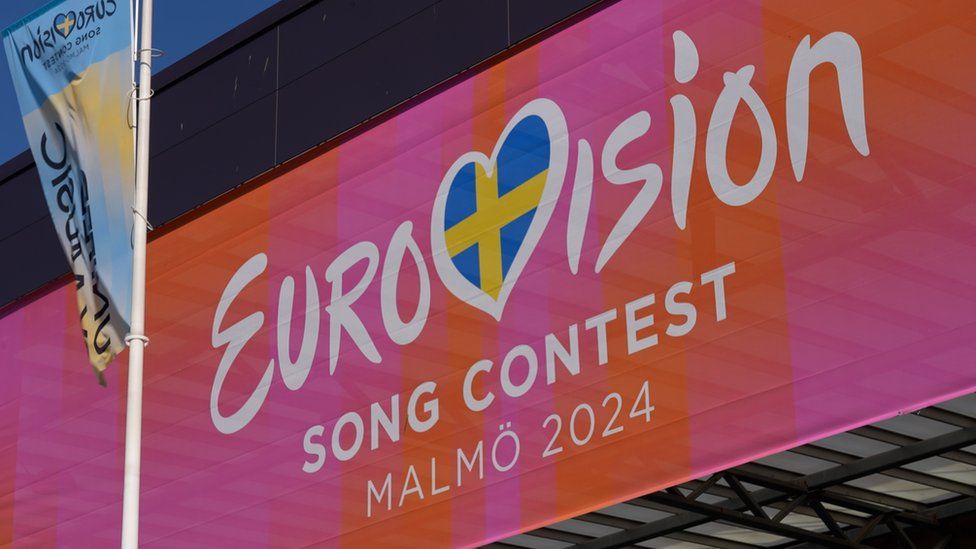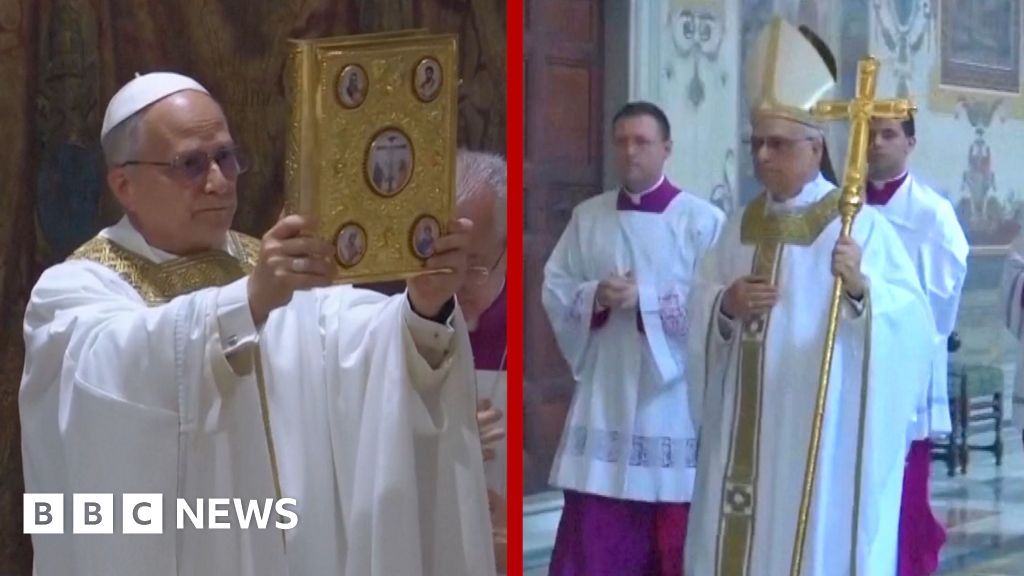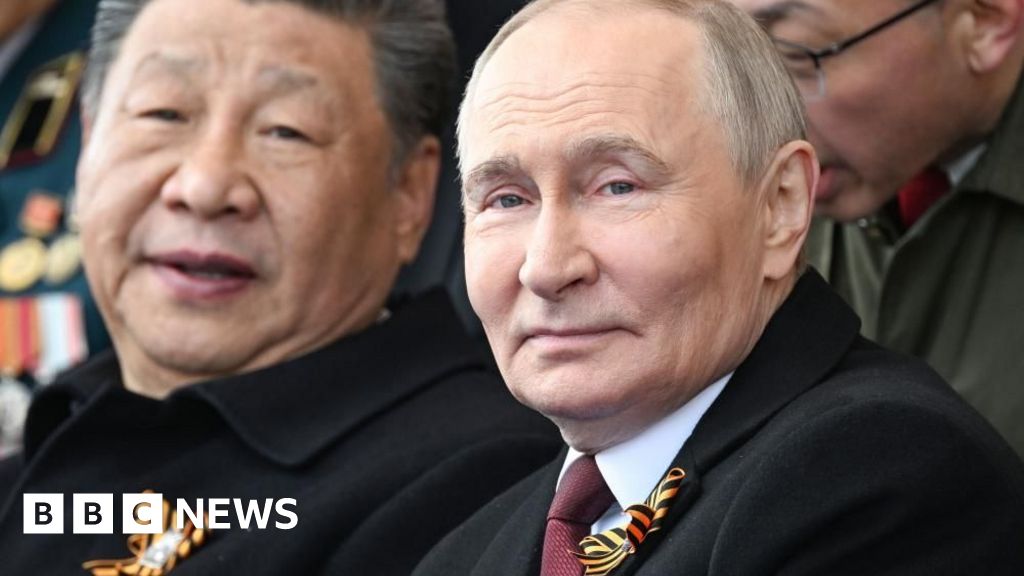ARTICLE AD BOX

As many as 100,000 people are expected to visit Malmo for the competition
By Adrienne Murray
Reporting from Malmo
Security is being tightened for the Eurovision Song Contest in Sweden's third city Malmo, with large demonstrations planned to coincide with the event and the country already on high alert.
Police and organisers say they're well-prepared and hoping for a "joyful" event.
The annual feel-good celebration of pop and showbiz is this year shrouded by complaints from some quarters over Israel's participation amid the war in Gaza. Sweden was already facing heightened security challenges, and Malmo is expecting one of the country's biggest ever policing efforts.
As many as 100,000 visitors are set to descend on this city on Sweden's south-west coast for the world's largest live music contest.
Colourful Eurovision banners decorate many of the city's streets, and it's the third time that Malmo is playing host, after Swedish artist Loreen won last year's competition in Liverpool, with her hit song Tattoo.
Image source, PA Media
Image caption,Sweden is hosting the event after Loreen won last year with her song Tattoo
A programme of festivities kicks off on Saturday, with semi-finals next Tuesday and Thursday, culminating in the grand final on 11 May. An estimated 200 million viewers worldwide are expected to tune in for the four-hour spectacle.
Forces have been drafted in from across Sweden, with reinforcements from neighbouring Denmark and Norway. Swedish police are usually armed, but some officers will carry larger weapons as a precautionary measure.
Malmo police chief Petra Stenkula said the whole country was already "on a terror level of four out of five".
"I think it's obvious that the world's insecurity has also affected Eurovision," she told the BBC. "In Sweden, and Malmo in particular, there have been protests against Israel taking part in the competition."
The police chief said there were no specific threats to the event, but the alert level was raised last August, following a spate of Quran-burnings that angered the Muslim world.
An internal police report, highlighted by Sweden's public broadcaster SVT, described Sweden as a "priority target" for violent jihadist groups. The 23-page threat assessment for Eurovision also cited unrest, cyber attacks and disruption of the broadcast as other potential risks.
"In Sweden, police are used to working with very complex issues, and we think we have good planning," said Petra Stenkula.
Cameras have also been set up and drones are being used for surveillance. Guests will also have to pass through airport-style security controls including scanners and searches, when entering venues and no bags are allowed.
"It's a huge thing for the city of Malmo. So, of course, it's important that everything works smoothly," said Per-Erik Ebbestahl, Malmo's security director. "We feel very well prepared."
Image source, EPA
Image caption,The people of Malmo have been looking forward to the contest for months
Authorities have been planning for months and also working with their counterparts in Liverpool, which hosted last year's competition. "It's been very, very, helpful for us," he told the BBC.
Malmo has hosted the Pope and also a Holocaust Remembrance conference two years ago. But the city's security director says what is new is the general threat towards Sweden and large gatherings.
"It's not aimed at Eurovision per se," he said, pointing out that similar security had been in place for recent ice hockey playoffs, and was also planned for this month's Taylor Swift concerts in Stockholm.
Ebba Adielsson, the executive Eurovision producer, said people from 90 countries were coming to see the event
Fencing had been erected and additional cameras were being mounted when the BBC visited the Malmo Arena on Thursday. Inside the venue, rehearsals were already under way for a show featuring 37 acts.
"We have really exciting shows coming up," said Ebba Adielsson, SVT's executive Eurovision producer.
"We know the debate out there, we know about the demonstrations and we are well prepared. We hear it and we respect it," she said. "But I sincerely hope that it doesn't overshadow it that much.
Israeli contestant Eden Golan, 20, and her song Hurricane will undoubtedly be in the spotlight.
Image source, Koko-Klik
Image caption,Eden Golan has been advised by Israel's security service to stay in her hotel room while in Malmo, reports say
Originally titled October Rain, the song had alluded to the Hamas attacks on southern Israel last 7 October. Israel's public broadcaster agreed to modify the lyrics, and the European Broadcasting Union (EBU), which is responsible for the contest, gave the song the green light.
About 1,200 people were killed in Israel and 253 others taken hostage during the Hamas attacks.
More than 34,500 people have been killed in Gaza since then by Israeli's military offensive, according to the territory's Hamas-run health ministry.
Commentators have suggested that it is one of the most politically-charged Eurovisions ever.
Earlier this year, 1,000 Swedish musicians signed an open letter urging Israel's exclusion.
Artists have also been targeted by criticism, and in a statement last month the EBU said: "We firmly oppose any form of online abuse, hate speech, or harassment directed at our artists."
Speaking to international reporters, this week Denmark's entrant SABA said she'd been under huge pressure: "I've received a lot of messages and people can be very personal... even on the street."
Image source, Getty Images
Image caption,Denmark's entrant SABA says she has been targeted online for her involvement in the contest
Israel's National Security Council on Thursday issued an advisory warning against travelling to Malmo.
With a population of 360,000, it is one of Sweden's most diverse cities. Some of Malmo's 1,200-strong Jewish community have said they feel nervous and apprehensive.
Malmo also has a sizeable Palestinian community, and the contest has provoked strong feelings and weekly protests for months demanding that Eurovision boycott Israel.
In the busy Triangeln area, Youma Kadoura, one of the rally organisers and a Palestinian resident, told the BBC: "Israel is not welcome to Malmo because they are bombing civilian people in Gaza."
Kadoura points out that Russia was banned after it launched its full-scale invasion of Ukraine in 2022.
"We cannot accept or normalise the genocide," she said: an accusation that Israel vehemently rejects.
Police told the BBC that 10 separate applications had been lodged for demonstrations in the coming week.
Two mass rallies in central Malmo, several kilometres away from the venue, will take place on Thursday and next Saturday, coinciding with the second semi-final and final.
Other protests will be "nearby" but not in front of the arena. An alternative music performance is also being staged.
Image source, Reuters
Image caption,Protests have been taking place against Israel taking part in the competition
Police expect the demonstration to be larger than the protests seen so far. "Some weekends we have had up to 20,000 people," said police chief Petra Stenkula.
"We're hoping that even if we gave a large number of protesters, they're going to follow the rules," says Per-Erik Ebbestahl, adding that previous protests have been well-organised and issue-free.
Among other demonstrations is a planned burning of a Quran, which police are yet to decide on. There is no law in Sweden that prohibits desecrating religious texts, but such acts have often provoked tension.
"It's something we work with all the time, but there have been some hard feelings before about these things in Malmo," said the city's police chief.
But despite the tension offstage, Eurovision will always remain Eurovision, with a raft of events including a special ABBA exhibition celebrating 50 years since the Swedish quartet stole the show with Waterloo.
"I really hope it's going to be a fantastic, joyful week here in Malmo," said Ebba Adielsson of Swedish TV. "Because there's so much love and passion for the Eurovision Song Contest."

 1 year ago
33
1 year ago
33








 English (US) ·
English (US) ·